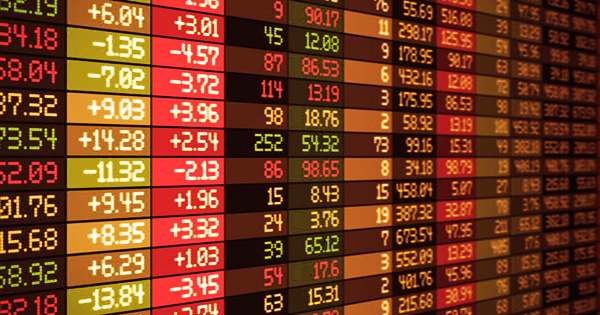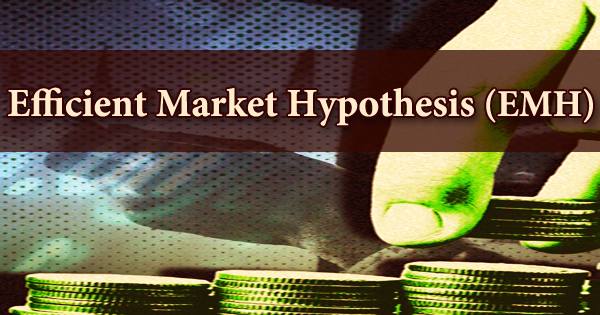The efficient market hypothesis (EMH) or efficient market theory is a financial economics hypothesis that states that asset prices represent all available information. It is a form of investment theory that is based on ideas from Eugene Fama’s study, as outlined in his book “Efficient Capital Markets: A Review of Theory and Empirical Work,” published in 1970. As per the EMH, stocks consistently exchange at their reasonable worth on trades, making it outlandish for financial backers to buy underestimated stocks or sell stocks at expanded costs. An immediate ramification is that it is difficult to “beat the market” reliably on a danger-changed premise since market costs should just respond to new data.
According to Fama’s theory, while an investor can strike it rich and buy a stock that generates massive short-term income, he cannot realistically expect to obtain a return on investment that is significantly higher than the market average over the long term. Consequently, it ought to be difficult to outflank the general market through master stock choice or market timing, and the lone way a financial backer can acquire more significant yields is by buying less secure speculations. Individual investors may behave randomly, but the market as a whole will still be “correct,” according to EMH. “Effective” means “natural” in simple terms.
Since the EMH is planned regarding hazard change, it possibly makes testable expectations when combined with a specific model of hazard. Therefore, research in monetary financial aspects since at any rate the 1990s has zeroed in on market inconsistencies, that is, deviations from explicit models of hazard. EMH proponents argue that investing in a low-cost, passive portfolio benefits investor. Opponents of EMH argue that stocks will deviate from their fair market prices and that it is possible to beat the market.

Fama’s investment theory, which is exactly the same as the Random Walk Theory in terms of implications for investors, is based on a variety of hypotheses regarding securities markets and how they function. The presumptions incorporate the one thought basic to the legitimacy of the productive business sectors speculation: the conviction that all data pertinent to stock costs is uninhibitedly and broadly accessible, “universally shared” among all financial backers. Modern risk-based asset pricing theories are based on the EMH, and models like consumption-based asset pricing and intermediary asset pricing can be thought of as a mixture of a risk model and the EMH.
Technical and fundamental research, in theory, cannot reliably generate risk-adjusted excess returns (alpha), and only inside knowledge will result in outsized risk-adjusted returns. Price fluctuations are always effective since there are always a large number of buyers and sellers in the market (i.e., in a timely, up-to-date manner). Subsequently, stocks are continually exchanging at their present honest evaluation. There are three types of EMH: frail, semi-solid, and strong1. Here’s what each says about the market.
- Weak Form EMH: Suggests that all previous knowledge is factored into the price of securities. Fundamental analysis of securities may provide investors with the knowledge that allows them to outperform the market in the short term, but no “patterns” exist. As a result, fundamental analysis will not provide a long-term benefit, and technological analysis will not be successful.
- Semi-Strong Form EMH: Infers that neither fundamental nor technological research can provide an investor with a competitive advantage and that new knowledge is immediately priced into securities.
- Strong Form EMH: Prices always reflect the entirety of both public and private information, according to the strong form of the EMH. This includes all publicly accessible records, both old and modern, as well as insider information. Indeed, even data not openly accessible to financial backers, for example, private data known distinctly to an organization’s CEO, is thought to be in every case previously figured into the organization’s present stock cost. Also insider experience, according to the strong form of the EMH, cannot provide investors with a predictive advantage that allows them to reliably produce returns that outperform the overall market average.
Defenders of the Efficient Market Hypothesis (EMH) reason that, as a result of the haphazardness of the market, financial backers could improve by putting resources into a minimal effort, latent portfolio. The EMH does not claim that no investor can outperform the market; rather, it claims that there are outliers who can outperform the market averages, as well as outliers who significantly underperform the market. The majority is closer to the median. Those who “win” are lucky and those who “lose” are unlucky.
The idea of market efficiency had been expected toward the start of the century in the thesis presented by Bachelier (1900) to the Sorbonne for his PhD in arithmetic. Allies and rivals of the effective business sectors speculation can both present a defense to help their perspectives. Supporters of the EMH often argue their case based on either the theory’s basic reasoning or a variety of studies that seem to back it up. Some investors will continue to try to outperform the market averages, assuming that stock price movements can be forecast to some extent.
Hence, EMH doesn’t line up with a specialized exchanging (also known as day exchanging) procedure. This is on the grounds that specialized merchants concentrate momentary patterns and examples and endeavor to identify purchasing and selling openings dependent on these examples. Furthermore, those who argue that the EMH hypothesis is flawed point out that there are periods when excessive optimism or pessimism in the markets causes stocks to sell at exorbitantly high or low levels, demonstrating that shares do not necessarily trade at fair market value. Traders would definitely reject the strong form of EMH.
The productive business sectors hypothesis was not mainstream until the 1960s when the coming of PCs made it conceivable to look at computations and costs of many stocks all the more rapidly and easily. On both theoretical and empirical grounds, the EMH’s validity has been challenged. However, advocates of the EMH claim that those who outperform the market do so due to the laws of probability, which state that in a market with a large number of actors, some will outperform the mean and others will underperform at any given time.
Investors who buy into the EMH are more disposed to put resources into aloof file finances that are intended to reflect the market’s general exhibition and less slanted to pay high expenses for master reserve the board when they don’t expect even the best of asset chiefs to fundamentally outflank normal market returns. If more people compete and bring more and different types of information to bear on the price, a market becomes more competitive.
Arbitrageurs will emerge as markets become more active and liquid, profiting by fixing minor inefficiencies as they occur and quickly restoring performance. However, since research supporting the EMH has shown how rare it is for money managers to consistently outperform the market, those few individuals who have mastered this ability are being increasingly sought after and valued.
Information Sources:
















